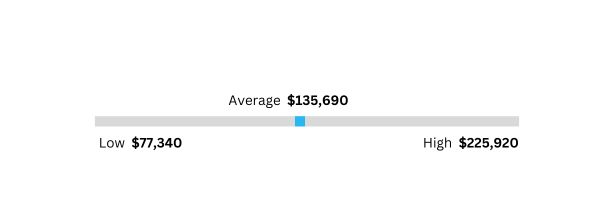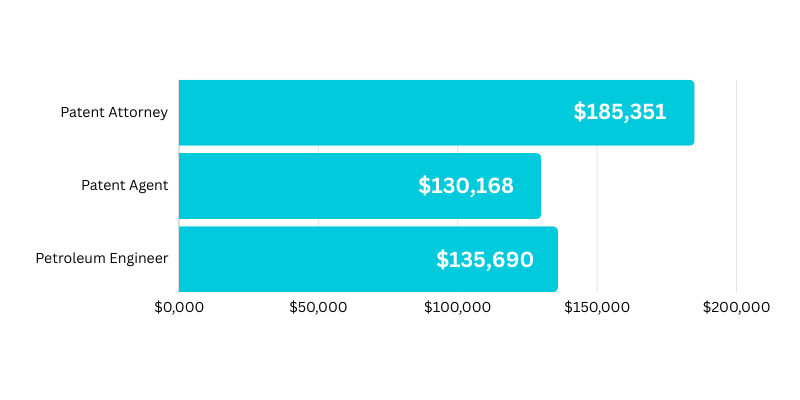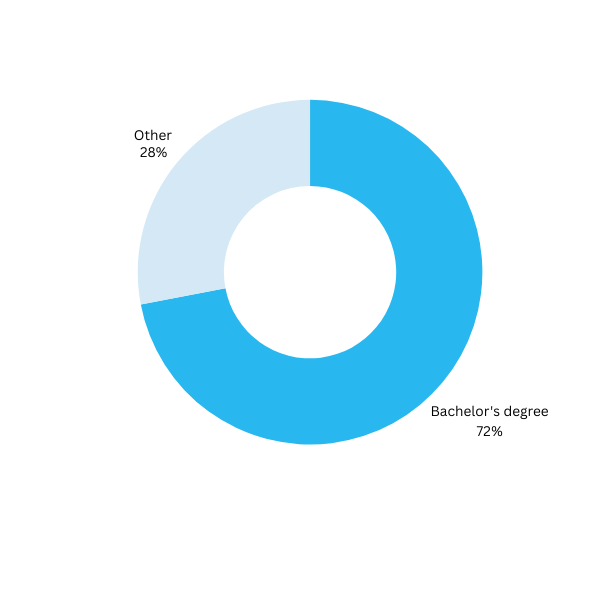Home > Career Insights > Petroleum Engineer Salary
Petroleum Engineer Salary & Career Insights
What is the average salary for a petroleum engineer in the United States?
Our salary data comes from BLS.gov. Salary data above is the median annual wage.
Job Outlook & Work Environment
Job Outlook
🚀 20,800; estimated number of petroleum engineer jobs. It is estimated that 500 new jobs will be added by 2033.
☀️ The projected job outlook is expected to grow at a rate of 2% which is slower than the growth of the average career.
Work Environment
💼 Most petroleum engineers work in offices or at drilling and well sites.
🏢 30% of petroleum engineers work in oil and gas extraction while 20% work in support activities for mining.
Petroleum Salary Salary in Comparison to Patent Law Salaries
How Does a Petroleum Salary Salary Stack Up?
A petroleum engineer earns a competitive salary of around $135K annually. Patent agents earn an average of $130K annually. However, a patent agent with a background in petroleum engineering likely earns more than the average patent agent since this is such a lucrative field. Patent attorneys earn an average of $185K annually which is higher than either career.
Top Petroleum Salary Salaries by Industry
| Industry | Average Salary |
|---|---|
| Credit Intermediation and Related Activities | $195,780 |
| Scientific Research and Development Services | $194,560 |
| Chemical Manufacturing | $187,920 |
| Management of Companies and Enterprises | $175,690 |
| Oil and Gas Extraction | $163,170 |
Salary by Petroleum Salary Industry
In the U.S., the average petroleum engineering salary is $135,690.
Petroleum engineers in the credit intermediation and related activities industry earn the highest average salary at $195,780. Those in scientific research and development services closely follow with an average salary of $194,560. In chemical manufacturing, management of companies and enterprises, and oil and gas extraction, petroleum engineers earn average salaries of $187,920, $175,690, and $163,170, respectively.
Experience & Education
Here are some typical daily activities of a petroleum engineer:
- Analyzing Data or Information — Breaking data or information into separate components to uncover underlying principles, reasons, or facts.
- Making Decisions and Solving Problems — Assessing information and reviewing outcomes to determine the best solution and address issues.
- Working with Computers — Utilizing computer systems and software to program, write code, configure functions, input data, or process information.
- Getting Information — Collecting information through observation, reception, and gathering from all pertinent sources.
- Identifying Objects, Actions, and Events — Categorizing and estimating information to recognize differences or similarities, and detecting changes in circumstances or occurrences.
Here are the typical skills you need to work as a petroleum engineer:
- Critical Thinking — Applying logic and reasoning to assess the strengths and weaknesses of different solutions, conclusions, or approaches to issues.
- Reading Comprehension — Grasping the meaning of written sentences and paragraphs in work-related documents.
- Active Listening — Paying close attention to others, understanding their points, asking questions when needed, and avoiding interruptions at inappropriate moments.
- Complex Problem Solving — Recognizing complex issues and examining related information to develop, assess, and implement solutions.
- Judgment and Decision Making — Evaluating the costs and benefits of possible actions to select the most suitable option.
Knowledge required to work as a petroleum engineer:
- Engineering and Technology — Understanding the practical application of engineering science and technology, including using principles, techniques, procedures, and equipment in designing and producing various goods and services.
- Mathematics — Proficiency in arithmetic, algebra, geometry, calculus, statistics, and their practical applications.
- Computers and Electronics — Familiarity with circuit boards, processors, chips, electronic equipment, and computer hardware and software, encompassing applications and programming.
- Physics — Insight into physical principles, laws, their relationships, and applications for understanding the dynamics of fluids, materials, and the atmosphere, as well as mechanical, electrical, atomic, and subatomic structures and processes.
Top Petroleum Salary Salaries by Location
Factors that Impact Pay
Petroleum engineers in Baton Rouge, LA, earn the highest average salary among the cities listed, at $179,490. Thibodaux, LA, follows with an average salary of $171,480. In Dallas, TX, Minneapolis, MN, and Denver, CO, petroleum engineers receive average salaries of $165,200, $164,670, and $164,210, respectively.
Petroleum engineers in New Jersey earn the highest average salary among the states listed, at $206,490. Minnesota follows with an average salary of $165,640, while Colorado offers $162,190. In Louisiana and Texas, petroleum engineers receive average salaries of $155,890 and $155,290, respectively.
Take a look at the average petroleum engineer salaries from top-paying cities according to Bls.gov data.
| City | Average Salary |
|---|---|
| Baton Rouge, LA | $179,490 |
| Thibodaux, LA | $171,480 |
| Dallas, TX | $165,200 |
| Minneapolis, MN | $164,670 |
| Denver, CO | $164,210 |
Look at the average petroleum engineer salaries from top-paying states according to Bls.gov data.
| State | Average Salary |
|---|---|
| New Jersey | $206,490 |
| Minnesota | $165,640 |
| Colorado | $162,190 |
| Louisiana | $155,890 |
| Texas | $155,290 |
Related Careers
Patent Agent
Patent agents practice patent law before the USPTO.
Average of $130,168/year
Patent Agent
Patent agents practice patent law before the USPTO.
Average of $130,168/year
Mechanical Engineers
Mechanical engineers plan and design tools, machines, and other mechanical equipment.
Average of $99,510/year



